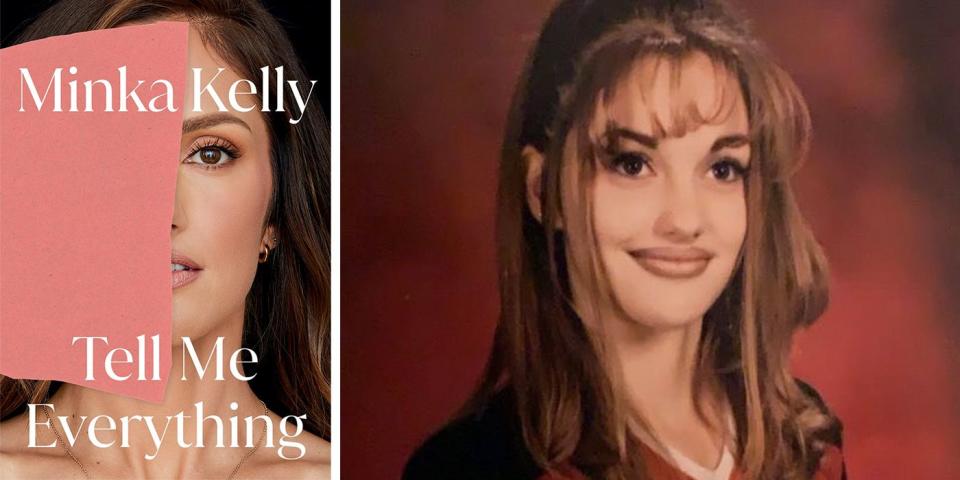Minka Kelly Is Finally Revealing the Truth About Her Past

"Hearst Magazines and Yahoo may earn commission or revenue on some items through these links."
There’s a moment in Minka Kelly’s new memoir when her therapist tells her to “stop acting like a stripper’s daughter.” What he means is that the actor, known for roles in Friday Night Lights and Titans, is putting up a false front, presenting herself as impeccably polished and successful, so that no one will ever learn about her past.
Tell Me Everything is, in effect, Kelly’s response to that therapist. After years of working through her childhood trauma, she’s opening up about her chaotic upbringing—and not just opening up, but inviting readers into the world of L.A. strip clubs and Albuquerque drug dealers where she came of age. The result is a stunner of a celebrity memoir: unexpected and moving, with a storyline that could easily power a prestige drama.

In fact, Kelly initially envisioned her story on the screen. “I first started writing this in the form that I’m most familiar with, which is a screenplay,” she tells Bazaar. When the movie idea fell apart due to the pandemic, she turned it into a book, drawing on her experience writing letters to her mother as a kid. “She and I were separated so much that the only way we could communicate was writing each other letters. So I got really comfortable with writing down my feelings.”
Kelly’s mother Maureen Dumont Kelly, who died of cancer in 2008, is a central figure in the book. An exotic dancer who would sometimes take her little daughter with her to work, she's depicted as warm, charismatic, and impulsive. Kelly describes witnessing her mom do a “bag lady” act in which she burst through the doors of the strip club with a shopping cart and slowly removed her layers of old clothes until it became clear she was actually one of the performers. Sometimes Maureen would disappear for weeks, leaving young Minka with a series of friends and acquaintances. When she was around, money was tight; for a while, they lived in a garage.
“I've been planning on [writing about my life] since high school,” Kelly says. “And I remember even in high school saying, She has to be dead before I do this, because if she knows what I know, she’d be heartbroken. As a child, I saw so much more than she thought I did. Like there’s a story in the book that I talk about, about noticing cocaine and going, ‘Mommy, what’s that?’ And she says, ‘That’s just my loose powder.’ I can very clearly see the texture of these two things. And the colors of these two things are very different. I’m not stupid, but I let her think that I was to save face for her. I didn’t want to embarrass her or challenge her.”
Kelly's father was a guitarist for Aerosmith, and throughout her youth, he dipped in and out of her life, sometimes offering brief moments of stability but never staying long enough for any kind of secure attachment to form. By the time she hit adolescence, Kelly was living in New Mexico with her stepfather’s extended family, skipping school and getting into fights with girls she barely knew.

It would be easy to just keep describing the events of the memoir, as Kelly gets a job at a peep show, escapes her abusive boyfriend, defends herself against assault-and-battery charges, becomes a sort of phone-service Robin Hood for the single moms of Albuquerque, and eventually winds up in nursing school with the help of the model for the RealDoll brand of sex dolls—and this is all before Taylor Kitsch even shows up. But what’s striking about the book isn’t just the things Kelly has survived, but also her perspective. As a narrator, she’s constantly trying to understand why people behave the way they do, without letting them off the hook. Her description of her mother is particularly nuanced, and the book’s real catharsis comes with Kelly figuring out how to forgive her.
“You can’t heal [these things] unless you’re able to see their side of the street,” she says. “That’s sort of how I try to move around the world now: Anyone that I come in contact with, I just try to see their broken heart. You’re able to give permission for people to be messy and not take it personally. And that’s been a real freedom.”

 Yahoo Autos
Yahoo Autos 